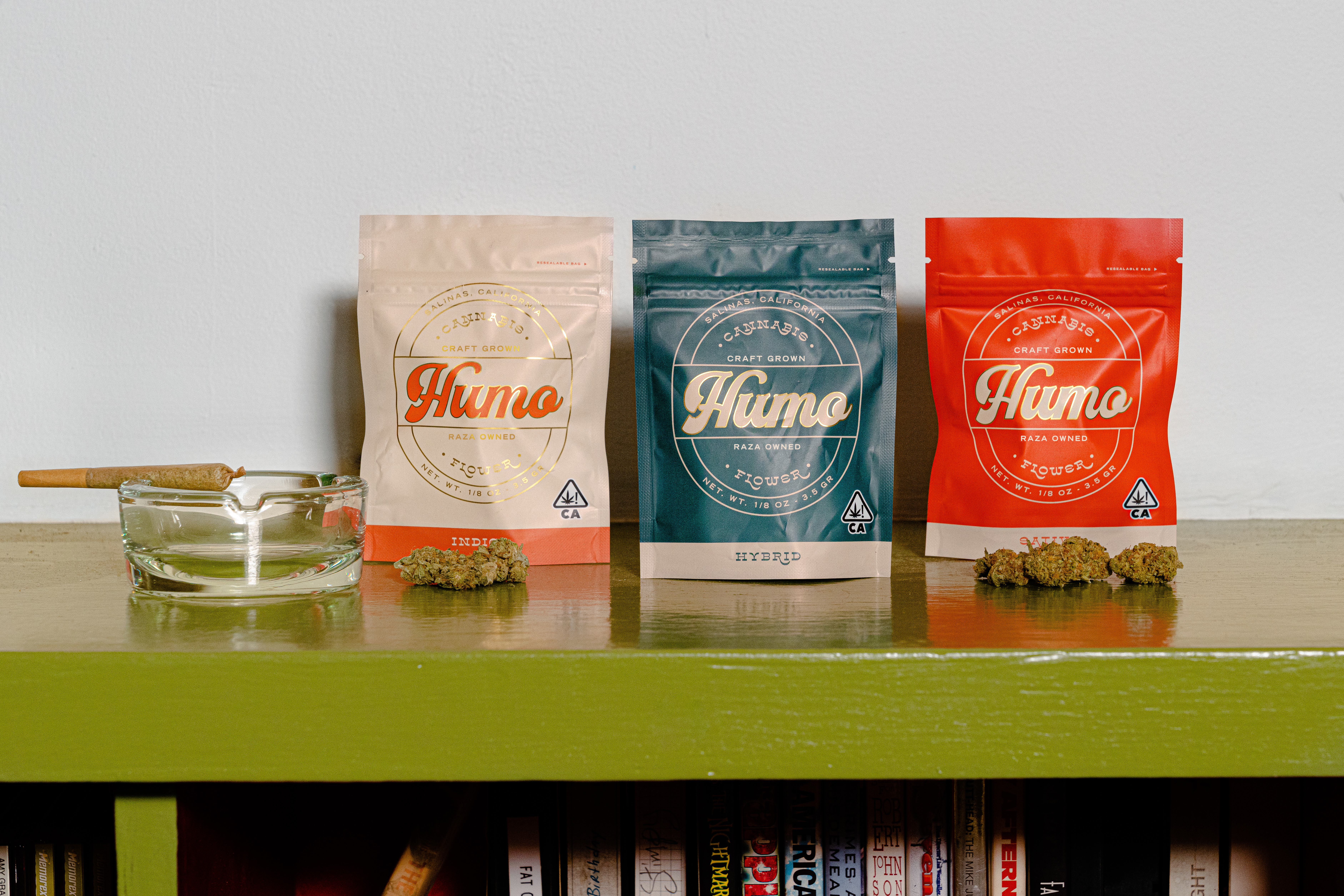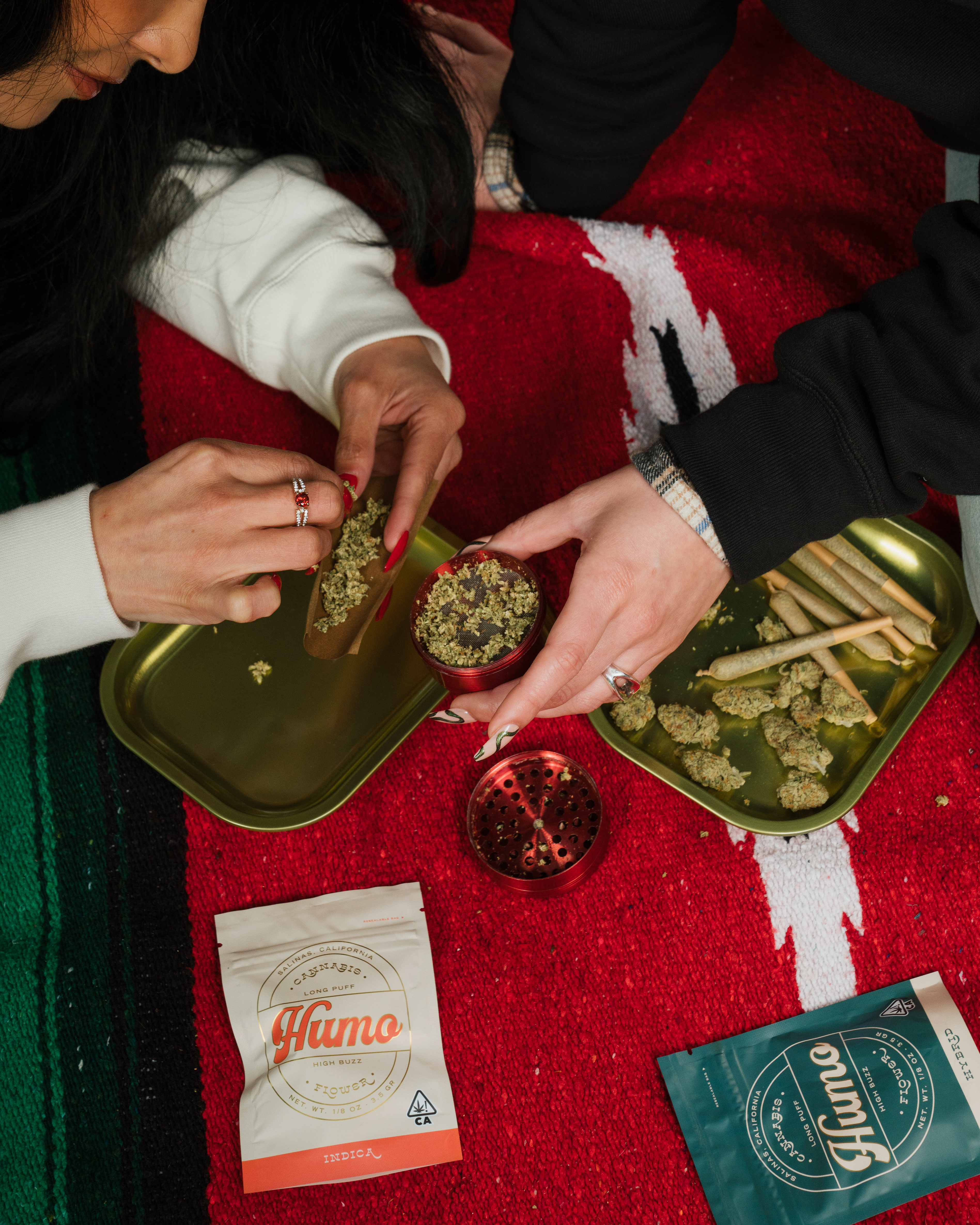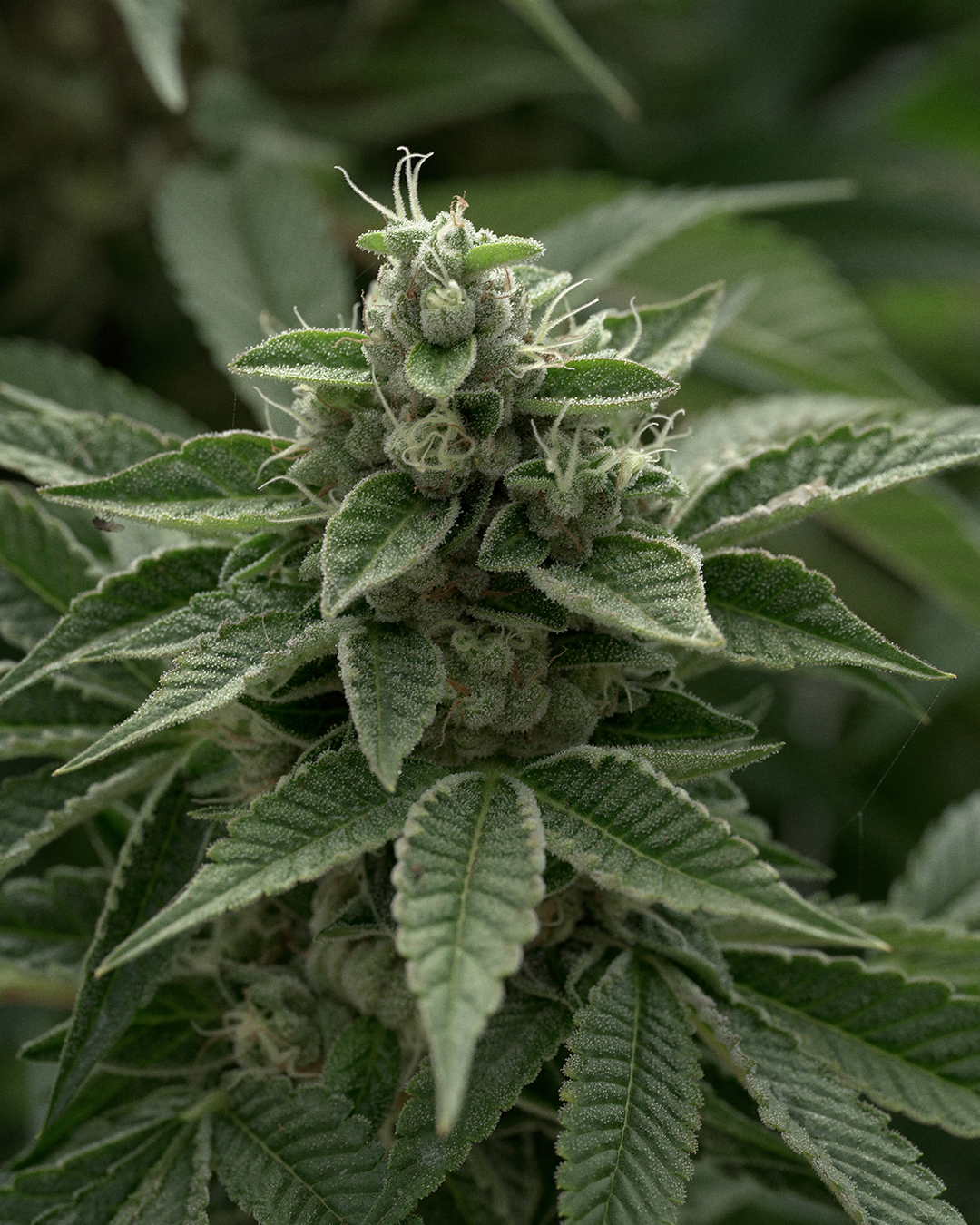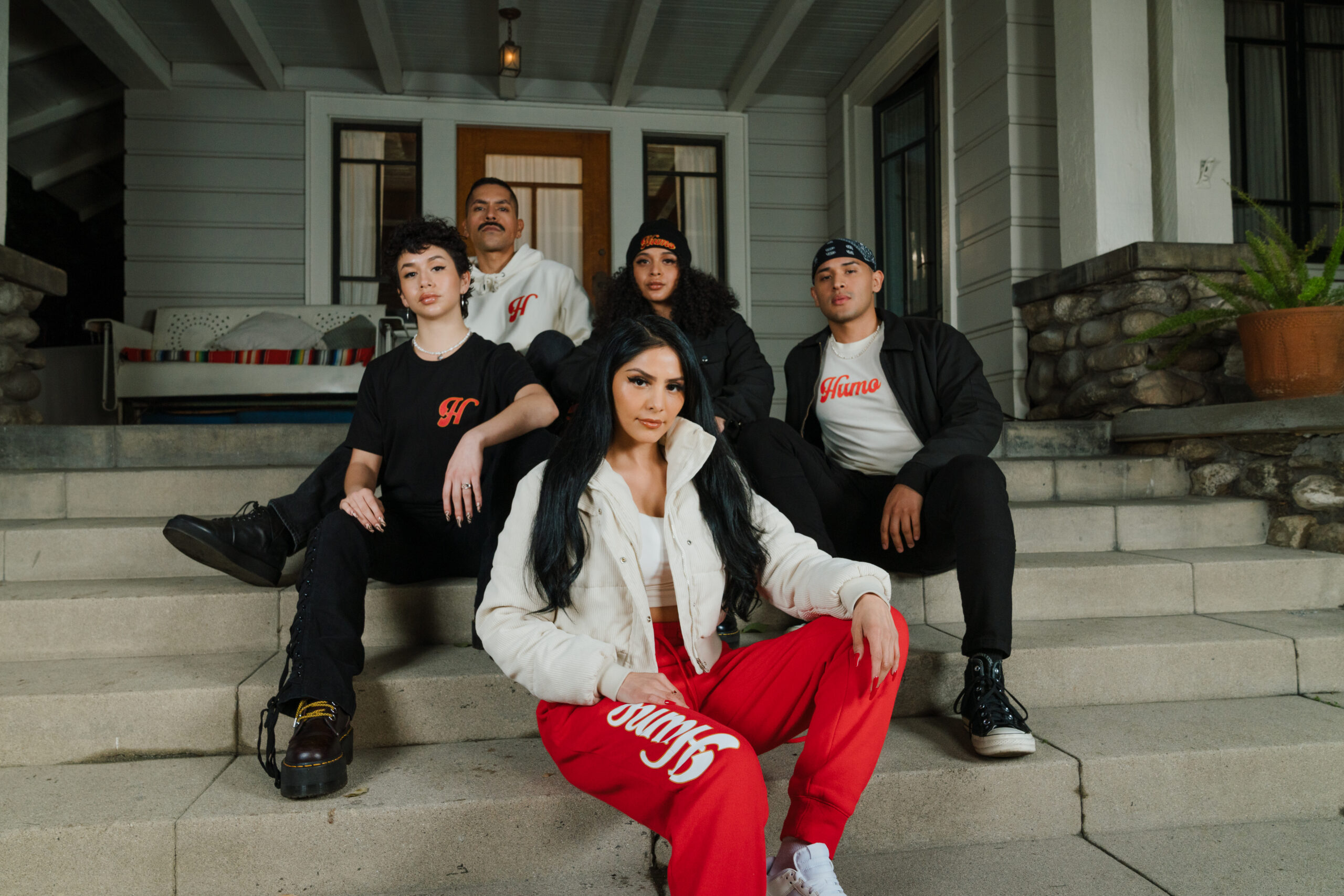Photo by Enkrypt
Everyone is getting stoned in 2022. From celebrities to college kids to grandparents, more people are consuming weed now than any other time in history — or perhaps more people are just admitting it. Regardless, the stigma around cannabis has been on a sharp decline since legalization first took effect in the US in 2014.
According to the CDC, 48.2 million Americans (about 18%) consumed cannabis at least once in 2019. A Gallup poll taken in 2021 said that 12% of US adults “smoke marijuana,” suggesting that this group uses it regularly. While the data shows the collective attitude is shifting away from Reefer Madness repulsion, the stigma continues to weigh on many BIPOC communities: Those most impacted by the War on Drugs. Humo, a Mexican American-owned weed brand in Los Angeles, is on a mission to shift the narrative around cannabis, particularly in the Latinx community.
“Latinos have had a long relationship with cannabis, despite [the] stigma,” said Susie Plascencia, brand partner for Humo and cannabis entrepreneur. “I’m extremely proud to be part of a team that’s helping the community normalize their relationship with the plant.”

Photo by Enkrypt
Humo hoists its brand on the motto, “By la raza, pa’ la raza,” which culturally translates to “by the people for the people.” It’s a signal to the Latinx community that (finally!) there’s a legal cannabis brand genuinely repping the culture. Plascencia and Jesus Burrola, CEO of POSIBL, Humo’s parent company, are dedicated to offering their community the Don Julio 1942 of flower: Sustainably grown cannabis with an elegant smoke, cured by the Monterey County sun.
“Latinos are driving so much of today’s economic growth, especially in one of the country’s fastest-growing industries – cannabis,” said Burrola. “We’re excited to bring our community a brand through which they — and our broader cannabis community — can identify the highest quality, sustainably grown flower at an affordable price.”
Humo (which translates to “smoke” en español) is offering strains with names such as “El Patron,” “Pulque,” and “Cajeta,” throughout California starting Feb. 1. Finally, the cannabis industry is getting the Mexican American weed brand it desperately needs.
We caught up with Plascencia and Burrola to talk about starting an authentic Mexican American cannabis brand, expungement programs, creating job opportunities for the Latinx community, and more.
*This interview has been edited for clarity

Photo by Enkrypt
MERRY JANE: In a sea of brands on shelves at dispensaries, what sets Humo apart?
Susie Plascencia: Aside from our sharp logo, our craft cannabis and mission-focused ethos is what sets Humo apart from other brands in dispensaries. As a Mexican American and woman-led brand, we aim to eliminate the stigma around cannabis use in the Latino community by celebrating our rich cultural history with the plant, normalizing its daily use, and offering premium and affordable flower that’s sustainably grown in a Smart Greenhouse powered by our parent company POSIBL.
Also, my experience as a journalist has influenced my approach to brand marketing. So, as part-owner and marketing lead, we’re starting strong by telling the story of our brand. We’re confident that with time, our audience will get to know our mission and vision for the industry, and be able to ask for us, by name, at dispensaries.
“Humo is by la raza, pa’ la raza.” For those who may not understand, what does this mean in Mexican culture and what does it aim to create in the cannabis industry?
Susie: The term La Raza means “the people” in Spanish and has its roots in the US Chicano movement of the 1960s. It was often used by early organizers in the California farmworkers justice movement, and since we’re a brand that supports local farmworkers in cannabis, we use it proudly to pay homage to their important work. Humo is “by the people, for the people” because we offer quality cannabis at a price that’s accessible, and we give back to the Latino community with career opportunities and sponsoring expungement clinics.
History shows that Mexicans are largely responsible for bringing cannabis into the United States — particularly into the West. Why is the Latinx community underrepresented in cannabis, despite its long, storied history with the plant? How is Humo addressing that?
Susie: There’s a heavy stigma in the Latino community regarding cannabis use due to the War on Drugs. This, along with miseducation on the effects of the plant, led many to hide their use or stop consuming entirely, which contributes to a lack of representation in the cannabis industry. Post legalization, however, Latinos are beginning to reconsider our relationship with the plant, which has created an opportunity to reach communities by acknowledging our culture and traditions through branding and products. Ultimately, it’s giving us the recognition we deserve. With Humo, we aim to give our Latino community an authentic brand we can all be proud of and support — one that celebrates our rich culture.
Let’s talk about the sustainable cultivation aspect of Humo and POSIBL. What makes POSIBL’s cultivation environment-friendly? Why is being a sustainably grown cannabis brand important to Humo?
Jesus Burrola: Indoor cannabis is traditionally seen as the only way to grow the highest quality flower year-round. With the right technology in a greenhouse, however, you can achieve comparable quality at a much more affordable price, and in a more sustainable way — that’s the vision behind POSIBL. Greenhouses take advantage of all the elements of our natural world, meaning that you don’t have to recreate them artificially through the use of energy. The simplest example would be sunlight: We take advantage of natural sunlight and supplement in artificial light as needed. This means you use less than a third of the energy than an indoor producer and can produce in a more efficient way.
This same concept applies to climate, ventilation, humidity control, and irrigation. As we look to shape the cannabis industry, it is important that we keep sustainability in mind and reduce the heavy carbon footprint indoor cultivation has on the environment.
Let’s talk about the career opportunities POSIBL and Humo provides to the Latinx community. What kind of employment opps can people look out for and how can they find them?
Jesus: Salinas is often called the “Salad Bowl of the World,” and its Latino population is over 75%. Despite the production in this area, it is estimated 1 in 4 still live in poverty. The cannabis industry in Salinas is providing better jobs to the Latino community. Being a greenhouse grower provides stable year-round jobs in conditions that are much better than the traditional agriculture jobs available. Prior to cannabis, this community had jobs out in the elements, in tough working conditions that were only available during harvest seasons. Now, with cannabis, you can not only work in controlled environments away from the elements but can do it year-round and at higher rates. The economic impact that cannabis can play in the Latino community is significant, this includes not just jobs in agriculture, but larger opportunities as well. We are very proud to be a Latino-owned and operated company.

Courtesy of POSIBL
Why is Humo interested in sponsoring expungement opportunities?
Susie: Repairing the harm caused by the War on Drugs begins with meaningful action. For many within the Latino community, a stable job equals dignity. But the truth is, because of overcriminalization efforts unfairly aimed toward communities of color, many people struggle with criminal records that prevent them from getting reliable work. By sponsoring expungement efforts with The Social Impact Center of Los Angeles, we aim to help those with prior cannabis-related convictions regain their dignity by earning a living.
What kind of strains will Humo be launching with? Where can people find them?
Susie: We’ll be launching with seven strains, each with names inspired by their terpene profiles, effects, and connection to aspects of Latino culture and traditions. For example, Pulque (pronounced: puhl-keh) is a pungent and potent indica we named after a traditional Mexican fermented drink made from the sap of the maguey plant, a cousin to the Tequila blue agave. During the Aztec era, it was considered a sacred drink reserved specifically for the gods and their priests, which is why we thought it was a fitting name for one of our highest THC strains. Cajeta is another one of our current indica-leaning strains. Pastelito, Jamaica, and La Novia are our hybrids, while Limonada and El Patron are our sativas. Because we’re powered by POSBIL, we’re able to consistently carry and expand our offerings and we’re excited to bring our cannabis community even more premium flower strains soon.
Anything else you want to say about HUMO or POSIBL?
Susie: We’re excited to expand our line of branded merchandise and feature limited collaborations with established and up-and-coming artists of color. More on that to come!











